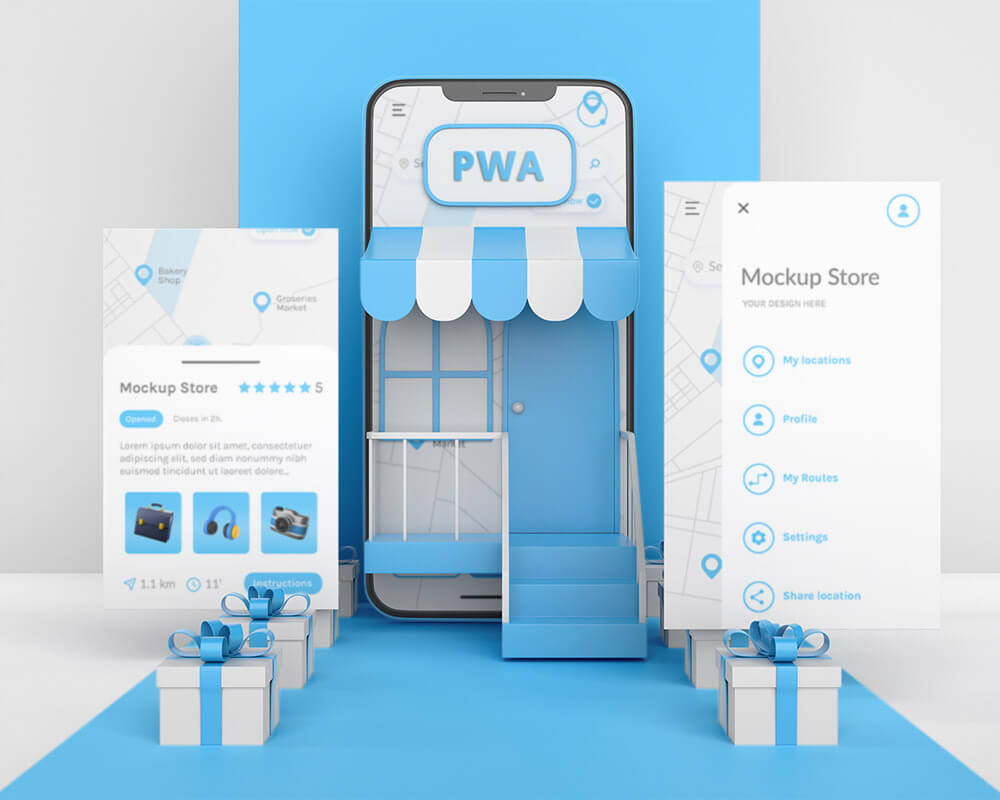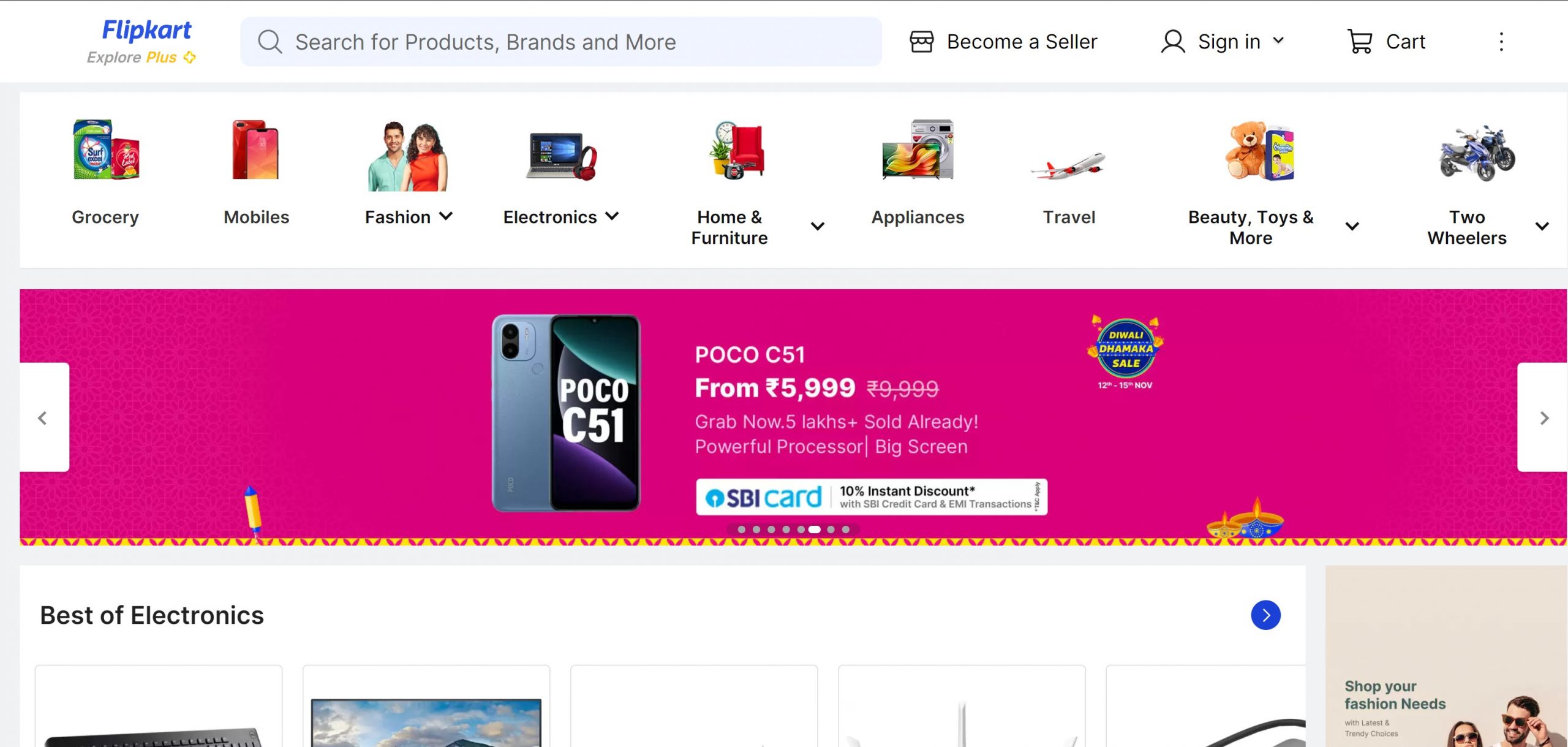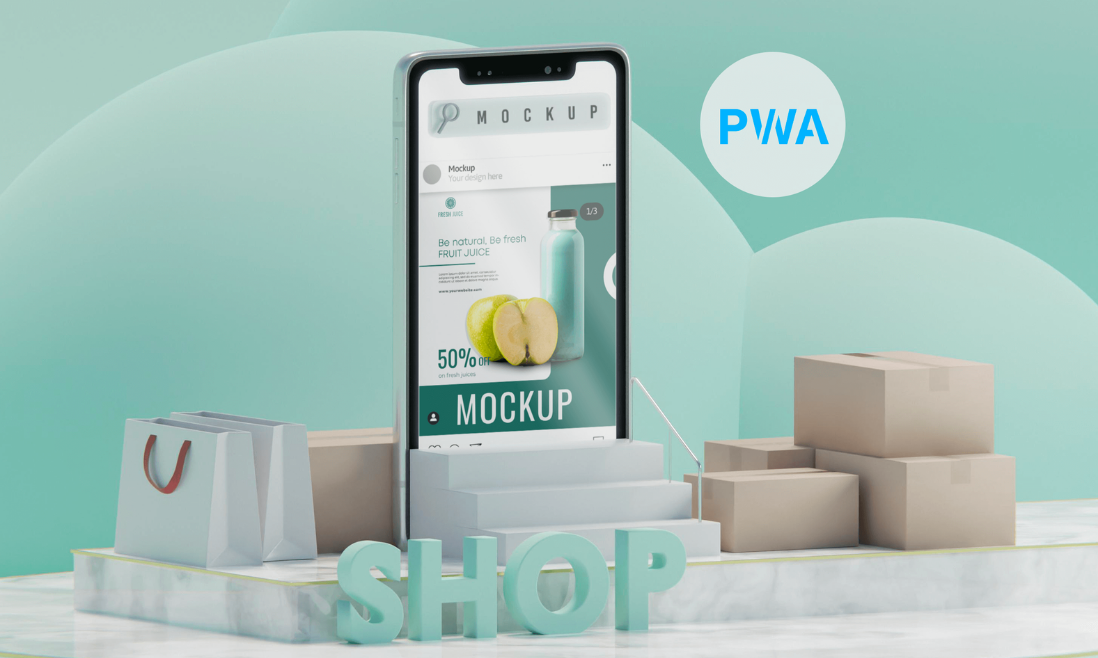The world of e-commerce is constantly evolving, and businesses are always looking for new ways to improve the customer experience. One of the most promising new technologies is Progressive Web Apps (PWAs).
PWAs offer a solution to the limitations of traditional websites. They are fast, responsive, and can work offline, making them a more convenient and engaging way to shop online. Businesses that adopt PWAs can expect to see increased conversion rates, improved customer satisfaction, and reduced development costs.
In this blog, we will explore the world of PWA e-commerce and learn how they are revolutionizing the digital business future. We will cover the benefits of PWA e-commerce, showcase real-world success stories, and provide practical tips for businesses to adopt this technology effectively.
What is PWA in Ecommerce?

PWA stands for Progressive Web App, a type of web application that uses modern web technologies to provide an app-like experience to users. In the context of eCommerce, PWAs offer several advantages over traditional websites, including:
- Faster loading times: PWAs are designed to load quickly and efficiently, even on slow or unreliable internet connections. This is because they cache content locally on the user’s device, which means that they don’t have to download all of the same data every time they visit the site.
- App-like features: PWAs can offer a variety of app-like features, such as push notifications, offline access, and home screen installation. This can make them more engaging and user-friendly than traditional websites.
- Improved conversion rates: PWAs have been shown to lead to higher conversion rates, as they provide a more seamless and enjoyable shopping experience for users.
- Reduced development costs: PWAs can be developed more quickly and cheaply than native mobile apps, as they don’t require separate development teams for each platform.
As a result of these advantages, PWAs are becoming increasingly popular among eCommerce businesses. Some of the most well-known brands that have adopted PWAs include Starbucks, AliExpress, and Pinterest.
7 Benefits of PWA for E-commerce
Discover the unparalleled Benefits of PWAs for E-commerce as they address these challenges, offering improved performance, seamless user interactions, and a cost-efficient alternative to propel your online business forward:
1. Improved User Experience

Progressive web apps (PWAs) offer several advantages over traditional websites for eCommerce businesses. One of the most significant benefits is that they provide a much better user experience. PWAs are designed to be fast, responsive, and reliable, even on slow or unreliable connections. They can also work offline, which can be a major advantage for users who are on the go.
In addition, PWAs can offer many app-like features, such as push notifications, home screen installation, and access to device features like the camera and microphone. This can make them more engaging and user-friendly than traditional websites.
2. Increased Engagement and Conversion Rates
PWAs have been shown to lead to increased engagement and conversion rates. This is because they provide a more seamless and enjoyable shopping experience for users. For example, PWAs can allow users to save their shopping carts and checkout without having to re-enter their information. They can also send push notifications to remind users about abandoned carts or to promote new products.
3. Reduced Development and Maintenance Costs

PWAs can be developed and maintained more cheaply than native mobile apps. This is because they are built on web technologies, which are already familiar to many developers. In addition, PWAs do not require separate development teams for each platform.
4. Increased Customer Satisfaction
PWAs can lead to increased customer satisfaction. This is because they provide a more reliable and responsive shopping experience. For example, PWAs are less likely to crash or experience downtime than traditional websites. In addition, PWAs can be updated automatically, without requiring users to download a new app.
5. Improved Brand Awareness
PWAs can help to improve brand awareness. This is because they can be installed on users’ home screens, which means that they are always just a tap away. In addition, PWAs can send push notifications to users, which can help keep the brand top of mind.
6. Reduced Bounce Rates
PWAs can lead to reduced bounce rates. This is because they load more quickly and efficiently than traditional websites. This can lead to improved SEO, as search engines prefer websites that have low bounce rates.
7. Increased App Installs

PWAs can be installed on users’ home screens, which can make them more likely to return to the site in the future. This can lead to increased sales and revenue.
Overall, PWAs offer several advantages over traditional websites for eCommerce businesses. By adopting PWAs, businesses can improve the customer experience, increase engagement and conversion rates, reduce development and maintenance costs, and improve brand awareness.
PWA Ecommerce Examples
Explore the forefront of online retail innovation with these PWA E-commerce examples. Find out how leading brands leverage PWAs to elevate user engagement, streamline transactions, and set new standards for the convergence of web and app technologies in the e-commerce landscape:
1. AliExpress

AliExpress is one of the best examples of how a PWA can be used to improve the eCommerce experience. The PWA is very fast and responsive, and it offers many app-like features, such as offline access and push notifications. As a result of these features, the PWA has been shown to lead to significant increases in conversion rates and customer satisfaction.
2. Starbucks

Starbucks is another great example of how a PWA can be used to improve the mobile eCommerce experience. The Starbucks PWA is fast and easy to use, and it allows customers to order and pay for their drinks without having to wait in line. This has led to significant increases in mobile ordering and revenue for Starbucks.
3. Flipkart

Flipkart is a leading Indian eCommerce marketplace that has used a PWA to create a more engaging and personalized shopping experience for its customers. The PWA allows customers to browse products, add items to their carts, and checkout without having to leave the app. This has led to significant increases in customer engagement and conversion rates.
4. Pinterest

Pinterest is a social media platform that has used a PWA to create a more immersive and engaging experience for its users. The PWA allows users to save pins, watch videos, and shop for products without having to leave the app. This has led to significant increases in user time spent on site and app installs.
5. Lancôme

Lancôme is a French luxury cosmetics company that has used a PWA to create a more personalized and interactive shopping experience for its customers. The PWA allows customers to scan products to see reviews and tutorials, and it also offers a virtual try-on feature. This has led to significant increases in customer engagement and sales.
These are just a few examples of how PWAs are being used to improve the eCommerce experience. As the technology continues to develop, we can expect to see even more innovative and creative uses for PWAs in the years to come.
9 Tips for Developing a Successful PWA E-commerce Store
To ensure the success of your PWA project, consider the following nine tips that encompass everything from design principles to performance optimization, providing a roadmap for creating a thriving and user-centric online shopping experience.
1. Define your goals and target audience

Before you start building your PWA e-commerce store, it’s crucial to have a clear understanding of your business objectives and the specific customer segment you aim to serve. This will guide your decision-making process and ensure that your store is tailored to meet the needs and preferences of your target audience.
2. Choose the right platform
Selecting the right platform for your PWA e-commerce store is essential for its success. Each platform offers unique features, strengths, and limitations. Consider factors such as scalability, ease of use, customizability, and cost when making your choice. Popular options include Shopify, Magento, WooCommerce, BigCommerce, and Volusion.
3. Design a user-friendly interface
The user experience is paramount for any e-commerce store, and PWAs are no exception. Ensure your store’s layout is intuitive, visually appealing, and easy to navigate. Prioritize clarity, organization, and accessibility to make the shopping experience seamless for your visitors.
4. Optimize your store for speed
In the fast-paced world of e-commerce, page loading speed is critical. A slow-loading store can lead to increased bounce rates, reduced conversions, and a negative customer experience. Optimize your store’s code, images, and assets to ensure lightning-fast loading times across all devices.
5. Offer a variety of payment options

Providing a diverse range of payment options is essential to accommodate the preferences of your global customer base. Integrate popular payment gateways such as credit cards, PayPal, mobile wallets, and local payment methods to ensure a smooth and convenient checkout process for your customers.
6. Make sure your store is secure
Security is paramount in e-commerce, as it protects sensitive customer information and builds trust. Implement robust security measures, including data encryption, secure authentication, and regular vulnerability scans, to safeguard your store and instill confidence in your customers.
6. Promote your store
Once your PWA e-commerce store is ready to go, you need to make it discoverable to your target audience. Utilize a multi-pronged marketing strategy that includes social media marketing, email marketing, search engine optimization (SEO), influencer marketing, and targeted advertising to drive traffic to your store.
7. Track your results
Data-driven decision-making is key to e-commerce success. Implement analytics tools to track key performance indicators (KPIs) such as traffic sources, conversion rates, customer demographics, and sales figures. Regularly analyze this data to identify areas for improvement and optimize your store’s performance.
8. Provide excellent customer service
Exceptional customer service is a differentiator in the competitive e-commerce landscape. Respond promptly to inquiries, address concerns effectively, and go the extra mile to resolve issues. Foster a customer-centric culture within your organization to build lasting customer relationships.
9. Keep your store up-to-date
The e-commerce landscape is constantly evolving, with new technologies, trends, and customer expectations emerging. Stay ahead of the curve by regularly updating your store’s design, features, and payment options. Embrace innovation and adapt to changing trends to maintain a competitive edge.
By following these tips and continuously refining your approach, you can increase your chances of developing a successful PWA e-commerce store that attracts, engages, and converts customers. Remember, success in e-commerce is a continuous process that requires dedication, adaptability, and a commitment to providing an exceptional customer experience.
A Credible PWA Development Agency
Suppose you want to find a PWA eCommerce development agency specializing in the Magento platform. Then no need to look for any other business because Tigren is here. We are confident we can be a great companion. Find more about our PWA eCommerce development services to get started!

We have more than ten years of experience providing eCommerce solutions for online businesses. Our developers have successfully developed an optimal PWA eCommerce development process. This process will help you get a PWA with minimal time and budget. Moreover, we offer post-development support, so you are confident with your new PWA.
It can be seen that PWA eCommerce development is an inevitable trend in online business. It can bring many benefits to both buyers and sellers. With PWA, many enterprises have successfully increased their conversion rates significantly.

